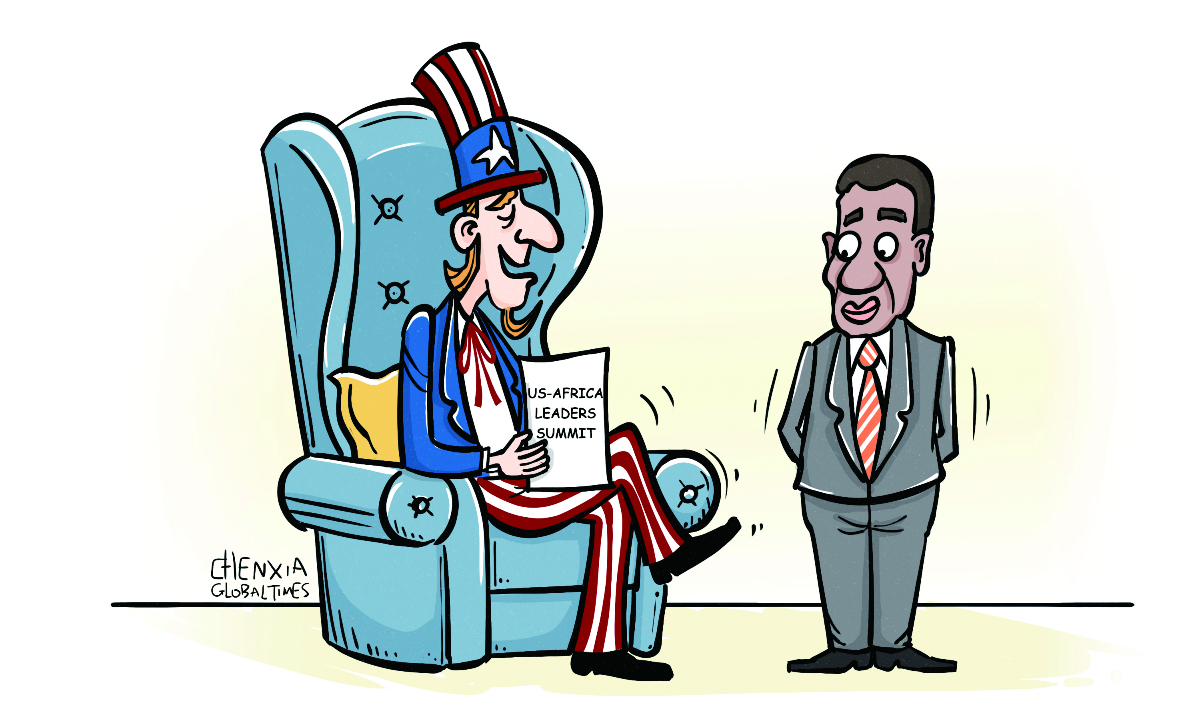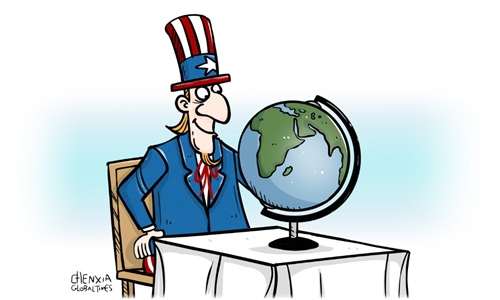
Illustration: Chen Xia/GT
The United States-Africa Leaders' Summit hosted by US President Joe Biden will take place from December 13 to 15, 2022 in Washington DC.
Per the organizers, the conference aims to demonstrate the commitment of the Biden administration to the African continent and to provide a forum for new joint initiatives between Africa and the US.
But evidence regarding the nature and dynamics of Africa-US relations thus far paints a picture of a powerful nation keen to contain the African continent as a recipient of aid.
The largest event any US president has held with heads of states and governments from Africa was in 2014 during the Obama administration.
This was 14 years after the Forum for China-Africa Cooperation (FOCAC) was established in 2000 as a uni-multilateral partnership between China and African states.
The inaugural 2014 summit was held under the theme '"Investing in the Next Generation'' but thereafter, all went quiet until now. Meanwhile, China holds FOCAC forums every three years to review the progress and advance diplomatic ties and commercial interest between the eastern nation and the African continent.
It is a little wonder that US exports of goods to the African continent was estimated at $26.7 billion in 2021. This represents a 30 percent fall from 2014 when the very first and only Africa-United States summit was held to date.
Further, the two-way trade was $64.3 billion which is barely more than 1 percent of the US global commerce and is another fall from a high of $141.9 billion in 2008.
Meanwhile, trade between China and Africa grows from one year to the next. Hitting a record high in 2021 when bilateral trade between China and Africa amounted to $ 254.3 billion, an increase of 35 percent. Even more, Africa exported goods to China worth $105.9 billion, an increase of 43.7 percent.
The facts are clear, the US is keen on advancing a dominating and domineering agenda in Africa. Thus far, President Biden is not scheduled to hold a single bilateral meeting or session with any of the African leaders invited to the summit which speaks volume. It is not a gathering of equals.
Meanwhile, China is on course to boost commercial interests with Africa. As of December 1, 2022, an additional nine African countries will enjoy wider tariff-free access to the eastern nation.
Nine other African nations having been enjoying similar benefits since September 2022. It is evident that China is on track to boost African imports to $300 billion before the end of 2025.
Besides the US, Russia, Turkey and Japan similarly hold African summits with lofty goals but no concrete results or outcomes. Meanwhile, the numbers are clear that China is rising to the challenge of the profile of an equal partner in a continent where countries have diverse needs.
While China and the US are among the most critical external stakeholders on matters security, peace and prosperity on the African continent, the US is keen on using Africa as a tool in a competition with China.
China, on the other hand, is demonstrating a clear understanding that the world order has significantly changed, requiring a shift in the manner in which powerful nations engage developing nations.
This Africa-US summit appears to be a thinly veiled knee-jerk reaction to weaken ties between China and Africa. But an attempt to contain China's influence in Africa is bound to fail because China-Africa ties are built on a friendship actively and mutually nurtured over the last 20 years without political interference.
US interference in politics across the African continent continues. The historical and strategic partnership between China and Africa is periodically evaluated and elevated above politics.
This consistent evaluation proves that Chinese-African ties run deep, are sustainable and mutually beneficial, providing a platform to address the most pressing needs facing the world today, and more so, developing countries in Africa including climate change.
The same cannot be said of relations and ties between the US and Africa. The former is rattled because China and Africa have found a common ground from which they launch actions that have had significant impact on the growth and development on the African continent.
Africa's message to the US that the continent has all it takes in terms of natural resources and human capital to launch a new era of accelerated development have largely been ignored. There is a push to contain Africa as a recipient of aid and to derail China's momentum on the African continent.
An uphill task, for Africa and China are matching to a similar beat when it comes to accelerating development. Their developmental paths are interlinked and intertwined on common ground with common vital interests that will last for generations to come.
The author is a Kenya-based journalist. opinion@globaltimes.com.cn


